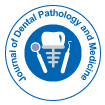Nuestro grupo organiza más de 3000 Series de conferencias Eventos cada año en EE. UU., Europa y América. Asia con el apoyo de 1.000 sociedades científicas más y publica más de 700 Acceso abierto Revistas que contienen más de 50.000 personalidades eminentes, científicos de renombre como miembros del consejo editorial.
Revistas de acceso abierto que ganan más lectores y citas
700 revistas y 15 000 000 de lectores Cada revista obtiene más de 25 000 lectores
Indexado en
- Google Académico
- ICMJE
Enlaces útiles
Revistas de acceso abierto
Comparte esta página
Abstracto
Assessing Delay in Care Caused by Oral Antineoplastic Medications
Cinzia Salmina
The advent of oral antineoplastic medications has brought remarkable convenience to cancer treatment, allowing patients to manage their therapy at home. However, this convenience comes with the potential for delayed care, which can significantly impact treatment outcomes. This abstract provides a concise overview of the complexities surrounding the assessment of delay in care caused by oral antineoplastic medications.
Oral antineoplastic drugs represent a paradigm shift in cancer treatment, offering patients the autonomy to self-administer their medication outside the traditional clinical setting. While this approach enhances the quality of life for patients, it introduces a unique set of challenges. Delay in care can manifest through missed doses, inconsistent adherence, and a lack of adequate monitoring, potentially leading to disease progression, increased toxicity, and reduced survival rates.
The date the prescription was written and received by the patient was determined. A retrospective review was completed to gather additional information, including prescribed medication, indication, insurance coverage, patient assistance program use, dispensing pharmacy, and prior authorization requirements. The data was analyzed through multivariate statistical analysis and used to identify risk factors that may significantly increase the time to medication receipt. A total of 58 patients were included in the study. A median of 8 days elapsed between when the medication was prescribed and when it was received by the patient. Medication prescribed, absence of a Risk Evaluation Mitigation Strategies (REMS) program, and insurance type are factors that increased time to medication receipt.
Revistas por tema
- Agricultura y acuicultura
- Alimentación y Nutrición
- Bioinformática y biología de sistemas
- Bioquímica
- Ciencia de los Materiales
- Ciencia general
- Ciencias Ambientales
- Ciencias Clínicas
- Ciencias farmacéuticas
- Ciencias Médicas
- Ciencias Sociales y Políticas
- Ciencias Veterinarias
- Enfermería y atención sanitaria
- Física
- Genética y biología molecular
- Geología y Ciencias de la Tierra
- Ingeniería
- Inmunología y Microbiología
- Química
Revistas clínicas y médicas
- Anestesiología
- Biología Molecular
- Cardiología
- Cirugía
- Cuidado de la salud
- Dermatología
- Diabetes y Endocrinología
- Enfermedades infecciosas
- Enfermería
- Gastroenterología
- Genética
- Inmunología
- Investigación clínica
- Medicamento
- Microbiología
- Neurología
- Odontología
- Oftalmología
- Oncología
- Pediatría
- Toxicología

 English
English  Chinese
Chinese  Russian
Russian  German
German  French
French  Japanese
Japanese  Portuguese
Portuguese  Hindi
Hindi